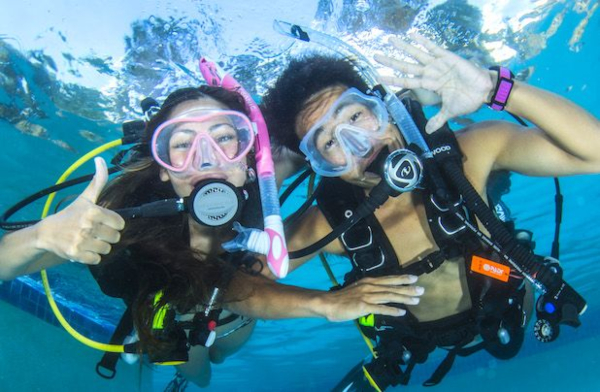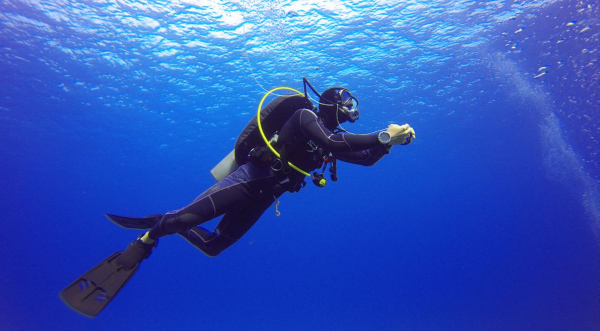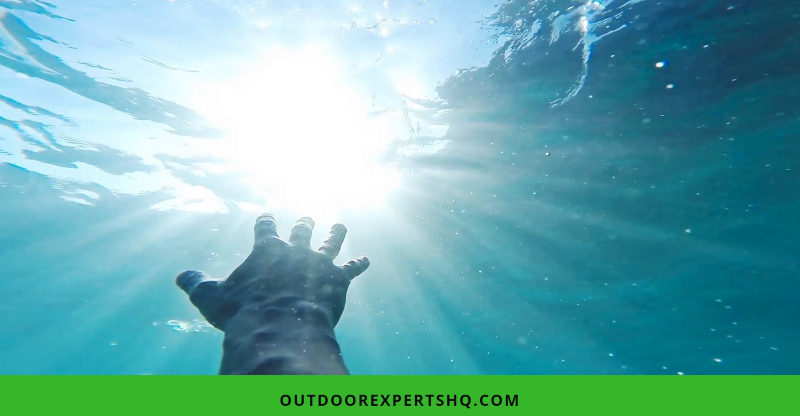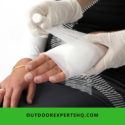Careless Scuba Diving May Kill You! Better Follow These Precautions
The fiery-haired Disney princess, the Little Mermaid, is a lucky one. It is almost ironic that she yearned for life above land as much we yearn to explore the deep sea. Thanks to Scuba Diving, we can take a good look at the underwater life every now and then.
But, neither we have the fins nor are we the descendants of the invincible Aquaman. That is why we need to keep a couple of scuba diving precautions in mind. These guidelines help up enjoy the Waterworld in safer conditions. Let us take a look at the top Scuba Diving precautions we need to follow every time.
Precautions for Scuba Diving
Scuba Diving is a sport that you can enjoy without any kind of intensive training. Though, you need to be careful about the basic instructions that you are given by your instructors. Here, we have divided these instructions into the three main stages of Scuba Diving. Read on to know what you need to take care of before, during and after your deep sea dive.
Preparation
Below are a few of the precautions that you need to follow before your dive.
Optimum Fitness Levels
Scuba diving is not a difficult sport to learn and enjoy. But that does not mean you can afford to participate in it when you are sick or hungover. Stay away from this sport until you are completely sure about your vitality. You need to be in good shape to endure the water pressure and other challenges that might come across underwater.

Make sure to get a medical exam done by your family doctor before you fly out to the sea. Though you don’t need one if you already have a diving certificate. Also, you will be required to sign a medical certificate before you start your training for scuba diving.
Diving Certification
One of the main reasons to get a dive certification is to score your favorite travel insurance. Most of the good travel insurance deals require a genuine certification for diving. So if you want your big and small trips to be covered by robust insurance plans, you need to get a dive certification pronto.
Your dive operator may provide you with few of the introductory diving courses too to obtain a basic certificate. However, you need to get an advanced certification if you are planning to go for a dive with higher difficulty levels. Always approach a licensed dive operator to learn or get certified from.
Scuba Gear Check
You need to make sure that your scuba gear is up to date with respect to the kind of dive you are planning. The night dive or nitrox dive requires a whole set of additional equipment that needs additional calibration. This means that you need to invest more time beforehand to make sure that you are in for a safe ride.
The buddy-check system provides you with a partner to keep track of your scuba gear as a team. Make sure you follow all the steps so that you and your buddy do not have to suffer through any equipment-related malfunction underwater. Most of the scuba gear accidents are a result of the diver incapability and not the inadequacy of the gear.
Dive Planning
The importance of planning out a dive cannot be stressed enough. The main reason for fatal emergency ascents is insufficient gas supply. This problem can easily be avoided by proper monitoring of the gas supply. The basics of the dive planning take care of all these big and small issues that might hinder your scuba diving experience.
It is always better to dive with a licensed scuba diver. Otherwise, make sure that you and anyone diving with you is capable of handling all the challenges that might come with this dive. Figure out the navigation, hand signals, and exit strategy beforehand. Keep track of the gauges to prevent the decompression and low air supply hazards.
Buddy System
The saying “when you dive alone, you die alone” is morbid indeed. But the BSAC and DAN Australia statistics inform that more than 86% of the fatal diving cases were diving alone. So this morbid saying does hold few grains of wisdom. Most of the underwater safety signals require a partner.

Today, you can get a solo diving certification. But that does not mean you need to avail it. Let the scuba diving practices catch up to the safe solo diving scenario first. Your diving buddy is your vital support system underwater.
That means you should not drift away from them too far underwater. You will risk your own and your buddy’s life by doing so and every minute is precious in case of an emergency. Make sure you know them well enough first to communicate properly underwater.
Now, let us take a look at all the dos and don’ts that we need to take care of during a scuba dive.
During Scuba Diving
The following precautions can help you no matter if you are a beginner or a seasoned diver.
No Touching the Underwater Life
There is nothing as vibrant and fascinating as the underwater world. But that does not mean you start shaking hands with them and picking them much to their dismay. Don’t annoy your kind host by barging in their peaceful existence like that. Because it might be fatal for you.
The neon colored plants and animals are often the most toxic. Sure, they seem too beautiful to resist a closer look. But, if you want to continue having a safe dive, leave the pretty rocks, fishes, and plants alone.

Few of them are seasoned hunters that transform from a rock to a flower and finally to a majestic octopus before you can exhale. And they are not the one running on an oxygen tank here! You just focus on maintaining that balance to stay buoyant for easy hovering over the reefs and corals.
Normal Breathing
The vital rules are often the simplest ones. In the case of scuba diving, just breath normally. You might feel the urge to hold your breath at times and thus stretch your oxygen supply. But don’t. That is the worst thing you can do for your lungs underwater. And it can quickly snowball into a fatal situation.
The air embolism and pulmonary barotrauma are the two serious threats that you risk when you hold your breath underwater. The phenomenon of air bubbles entering the bloodstream is known as the air embolism. The pulmonary barotrauma is lung injury due to over-pressurization.
You want neither of them. You need to breath normal while ascending and underwater. Make sure you are adhering to the specified depth limits too. Diverting from the specified depth limits a bit too much can over-exert your lungs quickly.
Equalize Before Descent
The human ear is not designed to handle the varying pressure changes during sky-diving, scuba diving, and other similar activities. That is why you need to equalize before you dive in. This must be done before you feel any kind of discomfort or injury.
The reason you need to equalize is to avoid the middle ear barotrauma. It is a shame that such an easily avoidable situation is so common among the divers nowadays. Today, it is the most-common pressure related to a middle ear injury.
The problem occurs when you fail to match the pressure increase in your middle ear to the outer and inner ear. There are a number of easy techniques to do so such as the Lowry Technique and the Frenzel Maneuver. You need to equalize your ears a couple of time beforehand to keep all kind of pressure change related ear injuries at bay.
Dive Within 40 meters of Dive Computer Limits
The recreational scuba limit as approved by most of the travel insurance plans is 40 meters. It is a good idea to stick to this safe limit and stay close to your diving instructor underwater. Usually, you won’t see much of value under this depth limit.
Wearing a diving computer gives you a clear idea of how much time you cant stay at that depth without any problem. Refer it regularly so that you can complete your dive in a well thought-out manner. Around 60 meters, the oxygen toxicity kicks in.
This means that the normal atmospheric air composition becomes toxic at this depth to the divers. You need to be a highly skilled diver carrying a more apt air mixture to dive safely beyond the 40 meters margin. The air consumption rate from the cylinders also increases beyond this point.
Let us move on to the important precautions to be followed after a dive.
After Scuba Diving
Below are the few important guidelines that must be followed after a scuba diving session.
Slowly Ascend
Aside from the obvious aesthetic appeal, ascending slowly from your dive have multiple health benefits. The main one is safety from the decompression sickness. While inside the water, your body absorbs a good amount of nitrogen. When you ascend slowly, the nitrogen is easily saturated from the body tissues.

However, when you ascend quickly, the nitrogen will rapidly expand within the body tissues. And thus will not be eliminated efficiently from your body. It often leads to tissue death and can be fatal in extreme cases.
The forceful inclusion of the nitrogen into the bloodstream due to bends or the decompression can easily be avoided. You just need to make a gradual ascent from the dive. This way the nitrogen will get enough time to dissipate from all over your body without any hassle.
No Flights For Next 24 Hours
It is a good idea to avoid getting on any flight for the next 24 hours after your dive. This way your body will get enough time to release the excess nitrogen out in the environment. There won’t be any cause for decompression sickness if you choose to travel after a full 24 hours break.
This range is from 18 to 24 hours. The different organization offers varying guidelines for air travel after a scuba diving session. Take a surface break of at least 12 hours after a single dive with zero compression. Multiple days of diving with no compression must be followed with at least 18 hours on the surface before any plane ride.
Dive with some decompression must be followed with 18 hours or more of a break from diving and onto the surface. In such a scenario, get on your flight only after spending at least 24 hours out of the sea and on the land.
Match Notes and Assess
It is common to feel a bit of fatigue if you don’t exercise on a regular basis. However, any other kind of discomfort must be notified to your instructor or your diving buddies so that you can get timely help. The first-timers must play close attention to their body response after the dive.
Also, it is a good habit to discuss the highs and lows of your latest dive with your team. This way you can plan better the next time. By doing so you will start tracing that learning curve of scuba diving easily. Keep track of the weights that you use during the dive.
Make sure to note down the weight levels that work for you and which don’t. It is a good practice to note down the crucial details of your dive every time. You can share it with your circle too so that you can have more fun and fewer worries the next time around.
These were a few of the main precautions that need to be followed without a miss after your dive.
Conclusion
If you can then you must try the out-worldly experience of scuba diving at least once in your life. Just as you prepare for your travel, you must prepare for your dives too. By paying the required attention, you can enjoy one of the most rewarding experiences that the endless ocean has to offer.
Are you planning to go for scuba diving soon? We hope that this article helps you with the basics of this amazing sport. Forward it to your friends and family on your socials for coordinating better on your next trip with them.









